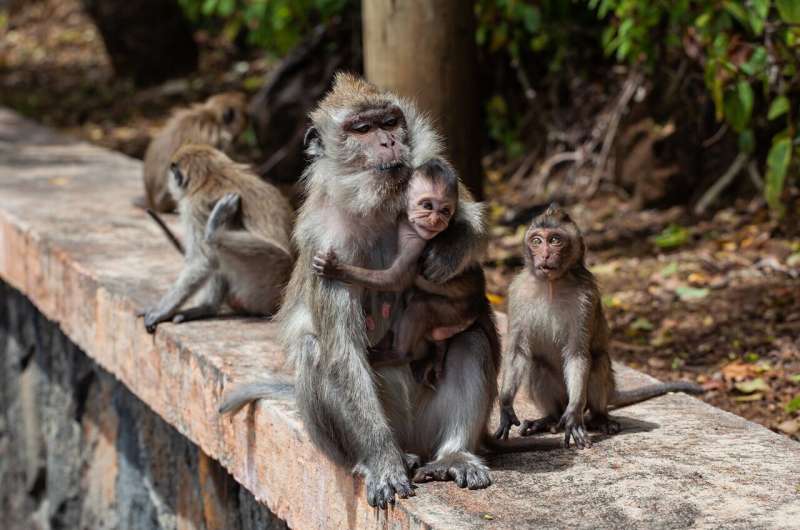Editors’ notes
This article has been reviewed according to Science X’s
editorial process
and policies.
Editors have highlighted
the following attributes while ensuring the content’s credibility:
fact-checked
peer-reviewed publication
trusted source
proofread
by Patrick Kurp, Rice University

While foraging, animals including humans and monkeys are continuously making decisions about where to search for food and when to move among possible sources of sustenance.
“Foraging behavior is something we perform daily when we go to the grocery store to pick up food, and we make choices based on the degree of reward each choice provides. It’s a classical problem common to every species on the planet,” said Valentin Dragoi, professor of electrical and computer engineering at Rice, professor of neuroscience at Weill Cornell Medical College and scientific director of the Methodist/Rice Center for Neural Systems Restoration.
In a paper published in Nature Neuroscience, Dragoi and collaborators investigate the brain processes involved in searching for food.
“In this study, we describe the use of a new integrated wireless system for recording brain activity in the frontal areas of their brain and for oculomotor and behavioral tracking. We examine in real time how this ubiquitous task of foraging unfolds, which is something we naturally perform every day,” Dragoi said.
Macaques are a genus of monkeys native to Asia, North Africa and Southern Europe (Gibraltar). They most often eat fruit, seeds and other plant-based food. “We study macaques,” Dragoi said, “because foraging is a natural behavior and the macaque brain is quite similar to the human brain in terms of organization and function.”
Until now, it was difficult to examine the neural basis of foraging in naturalistic environments because previous approaches relied on restrained animals performing trial-based foraging tasks. Dragoi and his research partners allowed unrestrained macaques to freely interact with reward options while wirelessly recording neural activity in their prefrontal cortex.
“Animals decided when and where to forage based on whether their predictions of reward were fulfilled or violated. The predictions were not based exclusively on a history of reward delivery, but also on the understanding that waiting longer improves the chance of reward,” Dragoi said.
The results indicate that foraging strategies are based on a cortical model of reward dynamics as animals freely explore their environment.
“We learned that we can predict choices even in complex situations by simply reading out the responses of dozens of neurons in the frontal lobe. This can potentially move in the direction of prosthetic devices to influence or bias choice, even noninvasively. More fundamentally, it allows us to understand how the brain works when engaged in this natural behavior,” Dragoi said.
Next, the Dragoi lab will combine foraging in a social context and record from two animals simultaneously while they cooperate to seek food as a reward. This is a daunting technical challenge but Dragoi believes he and his research partners are close to achieving such goals. This may enable a solution to the challenge of cortical implants to assist patients with brain dysfunction and enable their behavioral decisions.
The lead author of the article is Neda Shahidi, a former Ph.D. student in Dragoi’s lab, currently group leader at Georg-Elias-Müller-Institute for Psychology, Georg August-Universität, Göttingen.
More information:
Neda Shahidi et al, Population coding of strategic variables during foraging in freely moving macaques, Nature Neuroscience (2024). DOI: 10.1038/s41593-024-01575-w
Citation:
Study uncovers neural mechanisms underlying foraging behavior in freely moving animals (2024, April 20)
retrieved 21 April 2024
from https://phys.org/news/2024-04-uncovers-neural-mechanisms-underlying-foraging.html
This document is subject to copyright. Apart from any fair dealing for the purpose of private study or research, no
part may be reproduced without the written permission. The content is provided for information purposes only.

Giant galactic explosion exposes galaxy pollution in action
55 minutes ago

Crucial building blocks of life on Earth can more easily form in outer space, says new research
7 hours ago

Saturday Citations: Irrationality modeled; genetic basis for PTSD; Tasmanian devils still endangered
Apr 20, 2024

Lemur’s lament: When one vulnerable species stalks another
Apr 20, 2024

Scientists assess paths toward maintaining BC caribou until habitat recovers
Apr 20, 2024

European XFEL elicits secrets from an important nanogel
Apr 19, 2024

Chemists introduce new copper-catalyzed C-H activation strategy
Apr 19, 2024

Scientists discover new way to extract cosmological information from galaxy surveys
Apr 19, 2024

Compact quantum light processing: New findings lead to advances in optical quantum computing
Apr 19, 2024

Some plant-based steaks and cold cuts are lacking in protein, researchers find
Apr 19, 2024

